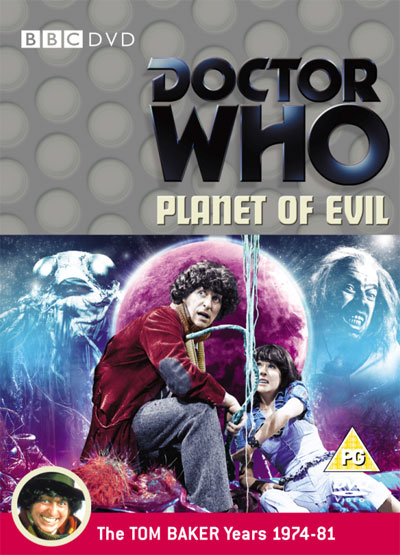
Aired 27 September – 18 October 1975
‘Planet of Evil’ is the second serial in what is widely regarded as one of the best cumulative seasons that Doctor Who has ever produced. For that very reason, though, it is often overlooked because of the presence of other true classics with more iconic moments. Although ‘Planet of Evil’ may not quite stand up to some of the stories of the time, it absolutely epitomizes Doctor Who as a franchise in general and manages to capture the unique essence of the early Tom Baker era deftly with stunning studio work that brings the horror-laden jungles of Zeta Minor to life beautifully.
Director David Maloney is able to instill a constant sense of peril into the jungle scenes even as the focus remains solely on a lone expeditionary team and the strange antimatter creature, and the first half of this serial is powerfully engrossing. That same sense of mystery and tension doesn’t quite transfer to the generic sterility of the spaceship in the latter half, but that is most certainly not down to the direction involved. Indeed, at least part of that may be attributed to the story gradually shifting the focus away from Frederick Jaeger’s scientist, Sorensen, and more to Prentis Hancock’s commander, Salamar, and Ewen Solon’s Vishinsky, both of whom fail to fail to make a positive and lasting impression. This could also be due to the story shifting from the more abstract horror of a living planet to the more generic one of several antimatter creatures wreaking havoc.
Notably, this is the first episode in which Tom Baker and Elisabeth Sladen share the spotlight without Ian Marther as Harry Sullivan, who remained on Earth after the preceding serial. There’s a sense that the show never truly found out what to do with the character of Harry once Tom Baker proved to be such a dominant performer that a male companion instantly became superfluous. Still, the chemistry between the two leads here is absolutely stellar and another fine example of why Sarah Jane Smith instantly became so likable and is still so fondly remembered. Here she has completely adapted to this new incarnation of the Doctor, unafraid to stand up to him when needed but also able to shrug off many of his eccentricities. Both characters prove very adept at taking a very active role as required, the Doctor’s irritability with militaristic stylings continuing to increase in the process.
‘Planet of Evil’ is a solid and entertaining serial, but any story in its broadcast position would fall into the same category of overlooked tales. The closing half may not quite live up to the superb ethereal excellence of its first half, but any foe which is able to bring out a true sense of fear and dread in the Fourth Doctor instantly makes it a credible and very threatening one. While not a true classic, ‘Planet of Evil’ is assuredly another strong step in the continuing refinement of producer Philip Hinchliffe’s era, bringing several intriguing ideas to the forefront while borrowing elements from some of the most famed literary horror tales.


Leave a Reply